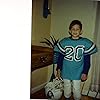Judite Valverde
asked:
I am not sure I will finish the book! Damn...so many good things to read and I am in a sort of pain reading this one... :/ Should I hope for better...pages?
To answer questions about
Rabbit, Run,
please sign up.
Shaun
This was one of the worst books I've ever read. It was boring and "Rabbit" was completely unrelatable. He was basically a lunatic who just did random, inexplicable things. I do not understand the appeal of this book at all. I suffered through the whole thing though so I can tell people, honestly, that I read the whole thing and, to quote the illustrious film critic, Jay Sherman, "It stinks!"
Caroline
I'm with Shaun. It's terrible, and I regret wasting time on it. I elaborated in my review, but Rabbit is an unlikable character that cannot be sympathized with at any point. Now, there's nothing wrong with unlikable characters--I've enjoyed many books containing them--but Updike failed to make Rabbit relatable in any way. When it comes to unlikable characters, readers have to be able to sympathize in some way, to at least understand why they're the way they are, and there's simply no understanding him. He's just a despicable man through and through. You have missed out on nothing. Move along to something else on your TBR and feel no regrets.
Paul Gleason
Please try reading Updike out loud. You'll catch the music of his prose. He's a genius English-lamguage prose stylist and ranks right up there with Nabokov and Joyce. The Rabbit books read like poetry, so much so that each line can be scanned for prosody...
Also, Updike was a true innovator. In the first Rabbit book, he captures suburban angst for the first time in American prose. The opening sequence, as beautiful as any opening sequence in American lit, is a stunning exploration of regret. It's almost a study of what happens when a person fails to exercise their potential (see Aristotle).
It's also to important Kierkegaard, who influences Updike greatly. Of course, Kierkegaard emphasizes subjective decisions in the construction of human identity. It's important to consider the tension between Rabbit's freedom and/or lack of freedom to make ethical decisions. What does choosing to "run" mean? Why does Updike include a comma in the novel's title? Is it an authorial command? The comma is key.
Lots to say about this book and its sequels, which cover four decades of American life. What a terrific presentation of 1950s' mores.
Updike's Rabbit, Roth's Zuckerman (in the American Trilogy), and Ford's Frank Bascombe all benefit from Updike's innovations.
Also, Updike was a true innovator. In the first Rabbit book, he captures suburban angst for the first time in American prose. The opening sequence, as beautiful as any opening sequence in American lit, is a stunning exploration of regret. It's almost a study of what happens when a person fails to exercise their potential (see Aristotle).
It's also to important Kierkegaard, who influences Updike greatly. Of course, Kierkegaard emphasizes subjective decisions in the construction of human identity. It's important to consider the tension between Rabbit's freedom and/or lack of freedom to make ethical decisions. What does choosing to "run" mean? Why does Updike include a comma in the novel's title? Is it an authorial command? The comma is key.
Lots to say about this book and its sequels, which cover four decades of American life. What a terrific presentation of 1950s' mores.
Updike's Rabbit, Roth's Zuckerman (in the American Trilogy), and Ford's Frank Bascombe all benefit from Updike's innovations.
Kim
I struggled trough parts of it. The best parts, for me, were Rabbit's struggle with his marriage (he isn't actually wrong about his wife) and part 9 where the story is told from Janice's perspective ( I don't want to give away too much here). I was gripped and eager to read more when I finished reading "Rabbit, run".
Updike's writing style is immersive once you give yourself over to the story. Rabbit is both likelable and detestable just like most ordinary folk. I suspect that is the overarching point of the story. We are Rabbit.
Updike's writing style is immersive once you give yourself over to the story. Rabbit is both likelable and detestable just like most ordinary folk. I suspect that is the overarching point of the story. We are Rabbit.
Cathi
Thank you for letting me off the hook. I, too, have found it painful to read this book. In the beginning, I wanted to sympathize with Rabbit because he seemed so unhappy and lost. My opinion changed rapidly as he continued his self-serving, narcissistic way through his story and there wasn't even a real story to follow. I'm adding Rabbit, Run to my "Gave Up" list - with no regrets.
Kamalpreet Singh
The purpose of art, according to Updike, was 'to give the mundane it's beautiful due'. That is what is entire oeuvre is about. Some people find this ability to pinpoint the most mundane of things brilliant, for others a larger landscape is more worthy of engaging. Updike is for the former. Like Alice Munro, or Flannery O' Connor. There's no grand scheme of things here, no great plot unravelling. Just the utter pointlessness and waste of everyday life. That is his art.
Steve
I liked the book it gives an accurate window into the late 50s . Its a mistake to compare Updike to Bellow or Mailer . Rabbit is an unlikable character but most men can see a little bit of ourselves in him .
Dennis
I am with you. I'm in the 40s and I'm falling asleep. He goes here then there, thinks this, thinks that. BOR-ING! This is my first Updike, but this is just not good writing at all.
Mark P
Don't feel guilty...Updike fall squarely in the self-indulgent navel gazing writing of the 1960-80's. Pseudo philosophical nonsense that received a lot of accolades which bear on nothing, AKA Shakespeare in Love. Listen to any Updike interview. Like Upton Sinclair, to paraphrase Papa Bear, "Updike is nothing."
No one will be reading this stuff 50 years from now.
No one will be reading this stuff 50 years from now.
Ryan Janus
I'm with Shaun, Caroline and the others (you can read my review if you want). Move along, don't waste your time. That said, the one part of Paul Gleason's comment I agree with is the opening scene with him playing basketball with the kids. That was actually a great scene, and it hooked me (hoodwinked me?) into reading the rest of the book, which was not at all like what he set it up to be.
Amir A.
Struggling with this, also; but almost halfway through so I'll probably plow on.
About Goodreads Q&A
Ask and answer questions about books!
You can pose questions to the Goodreads community with Reader Q&A, or ask your favorite author a question with Ask the Author.
See Featured Authors Answering Questions
Learn more











